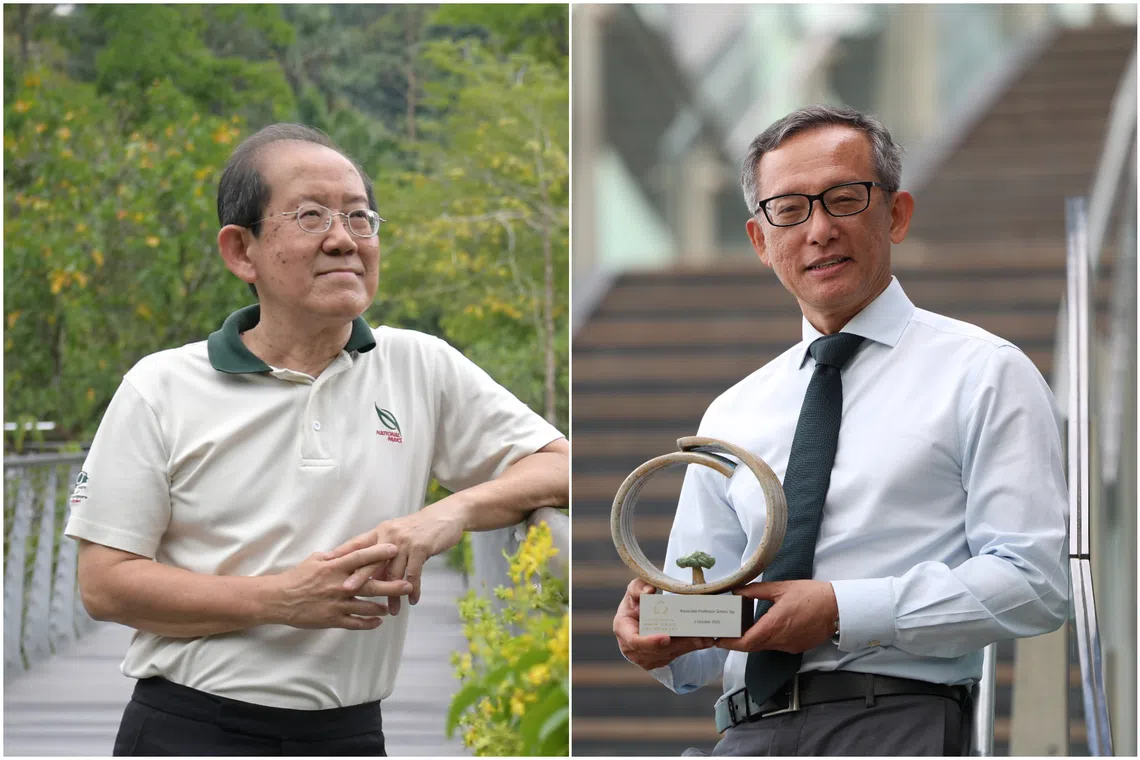Champions of conservation and haze action receive Singapore’s highest environmental award
Sign up now: Get ST's newsletters delivered to your inbox

The late Dr Leong Chee Chiew (left) had led multiple efforts in turning Singapore into a city in nature, and Associate Professor Simon Tay advocated for action against transboundary haze.
PHOTOS: ST FILE, LIANHE ZAOBAO
SINGAPORE – A former parks commissioner and an environmental lawyer received the country’s highest environmental accolade on Oct 2.
The late Dr Leong Chee Chiew had led multiple efforts in turning Singapore into a city in nature, and Associate Professor Simon Tay advocated for action against transboundary haze.
Dr Leong, who died of cancer in 2024 at the age of 72
In the educational institution and organisation categories, the top awards went to Nanyang Technological University (NTU), Mandai Wildlife Group (MWG) and CapitaLand Group.
President Tharman Shanmugaratnam handed out the awards during a ceremony at Gardens by the Bay on Oct 2.
The family of Dr Leong said in a statement: “The most fulfilling thing about his career was the ability for him to nurture those under his care. He would personally get to know his staff and mentor them when possible, basically being a father to them.
“He was the happiest when working quietly on the ground, never seeking attention or recognition for his work. It is, therefore, incredibly fitting to his character that he cannot receive this award in person.”

The family of the late Dr Leong Chee Chiew said he was the happiest when working quietly on the ground, never seeking attention or recognition for his work.
PHOTO: LIANHE ZAOBAO
Dr Leong – a former commissioner of parks and recreation – helped the Singapore Botanic Gardens secure Unesco World Heritage status in 2015 and led the OneMillionTrees movement, which was launched in 2020.
He was the National Parks Board’s deputy chief executive between 1996 and 2020.
In his 40 years of service dedicated to greening Singapore, he was involved in the creation of Singapore’s Nature Park Network, which connects the country’s green spaces, and helped develop the 20-year-old Community in Bloom nationwide gardening programme.
Prof Tay came to the fore in the late 1990s for his work to address transboundary haze.
An environmental lawyer by training, Prof Tay is chairman of the Singapore Institute of International Affairs (SIIA), a think-tank that provides insights on issues affecting Singapore and the region.
The worst haze episode of the 1990s happened in 1997, when the Republic was shrouded in a pall of thick smoke for over two months.
“Here was a problem facing the young and old, and vividly in my own family, I could see it. Then, I was a young Nominated MP (NMP), I taught environmental law, I had to try to do something about this,” said Prof Tay, 64.
In 1998, he chaired the first regional dialogue on the cross-border crisis with Indonesian and Malaysian experts and non-governmental organisations.
The same year, Prof Tay initiated the first parliamentary motion on transboundary haze, urging the Government to work towards a binding treaty that ensures that the countries causing the haze take responsibility.
The haze that blows into Singapore usually comes from forest fires in Indonesia linked to expanding plantations and agriculture.
Prof Tay, then NMP Zulkifli Baharudin and a representative from the Singapore Environment Council later flew to Indonesia to make an appointment with the environment minister.
This was followed by years of advocating for action against the haze, with Prof Tay certain that a bigger haze episode would come soon amid climate change and expanding plantations in Indonesia.
“At SIIA, we pushed very hard for a haze pollution Act or a form of legal liability,” he said.
The next big haze episode happened in 2013, when the three-hour PSI peaked at 401 in June.
That incident spurred and hastened the creation of the Transboundary Haze Pollution Act in 2014 – a law that criminalises activities causing or contributing to haze in Singapore, even if they occur outside the country.
Prof Tay’s haze advocacy continues today, as he leads the SIIA in putting out a report detailing the haze outlook for the year, based on trends in weather, forestry developments in the region, politics and policies.
Reflecting on the past three decades, Prof Tay said that the region has not solved the haze issue. “We’ve managed it, and we will continue to need to manage it. It’s a world of turmoil, so many problems can happen.”
In the organisation category, CapitaLand Group was lauded for prioritising sustainability in its operations in its bid to get to net zero by 2050. These include using innovative design approaches, incorporating low-carbon building materials and having efficient construction practices.
MWG clinched the award for its efforts to save threatened animals in South-east Asia, in addition to its other conservation, sustainability and net-zero efforts.
The group supports its conservation arm, Mandai Nature, in more than 40 projects in the region to safeguard critically endangered species. Each year, MWG’s Wildlife Healthcare and Research Centre
NTU won the award in the education institution category after it became the world’s first university to issue a publicly offered sustainability-linked bond



